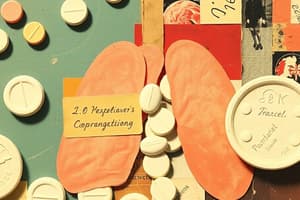Podcast
Questions and Answers
What is the recommended age for children to use over-the-counter cough and cold products according to the U.S. Food and Drug Administration (FDA)?
What is the recommended age for children to use over-the-counter cough and cold products according to the U.S. Food and Drug Administration (FDA)?
- 4 years and above
- 5 years and above
- 3 years and above
- 2 years and above (correct)
What is the cause of most common colds?
What is the cause of most common colds?
- Allergic reaction
- Viral infection (correct)
- Fungal infection
- Bacterial infection
What is the main purpose of the treatment for the common cold?
What is the main purpose of the treatment for the common cold?
- Preventing secondary infections
- Reducing mucus production
- Symptomatic relief (correct)
- Eliminating the causative pathogen
Which substances are released due to mucosal irritation in the nasal passages?
Which substances are released due to mucosal irritation in the nasal passages?
What is the main outcome of treatment for the common cold with antivirals and antibiotics?
What is the main outcome of treatment for the common cold with antivirals and antibiotics?
Why is it difficult to identify the cause of the common cold as viral or bacterial?
Why is it difficult to identify the cause of the common cold as viral or bacterial?
What is the result of excessive mucus production in the upper respiratory tract during a common cold?
What is the result of excessive mucus production in the upper respiratory tract during a common cold?
What is the mechanism of action of inhaled intranasal decongestants?
What is the mechanism of action of inhaled intranasal decongestants?
What is the primary purpose of antitussives?
What is the primary purpose of antitussives?
How do opioid antitussives suppress the cough reflex?
How do opioid antitussives suppress the cough reflex?
What is the primary function of expectorants?
What is the primary function of expectorants?
What are the adverse effects of decongestants?
What are the adverse effects of decongestants?
What is the primary concern with opioid antitussives?
What is the primary concern with opioid antitussives?
When are antitussives specifically indicated for use?
When are antitussives specifically indicated for use?
What are the adverse effects of antihistamines?
What are the adverse effects of antihistamines?
What are the conditions in which antihistamines are contraindicated?
What are the conditions in which antihistamines are contraindicated?
What is the role of H2 blockers?
What is the role of H2 blockers?
What are the effects of antihistamines?
What are the effects of antihistamines?
What is the main function of antihistamines?
What is the main function of antihistamines?
What is the role of histamine in allergic disorders?
What is the role of histamine in allergic disorders?
Which drug is the best choice for a 94-year-old patient with a severe dry cough, chest muscle pain, unsteadiness, and confusion?
Which drug is the best choice for a 94-year-old patient with a severe dry cough, chest muscle pain, unsteadiness, and confusion?
Which drug is most effective for helping a patient with a tracheostomy who has developed pneumonia and is finding it difficult to cough up thick, dry secretions?
Which drug is most effective for helping a patient with a tracheostomy who has developed pneumonia and is finding it difficult to cough up thick, dry secretions?
Which drug is not suitable for a patient with severe dry cough and chest muscle pain?
Which drug is not suitable for a patient with severe dry cough and chest muscle pain?
Which condition is a contraindication for using guaifenesin (Mucinex)?
Which condition is a contraindication for using guaifenesin (Mucinex)?
Which drug should be avoided in a patient with thick, dry secretions and difficulty coughing?
Which drug should be avoided in a patient with thick, dry secretions and difficulty coughing?
Which drug is used to thin excessive mucus in the respiratory tract?
Which drug is used to thin excessive mucus in the respiratory tract?
Which drug may cause respiratory or CNS depression and is an opioid?
Which drug may cause respiratory or CNS depression and is an opioid?
Which drug is an expectorant that helps in the coughing up and spitting out of excessive mucus?
Which drug is an expectorant that helps in the coughing up and spitting out of excessive mucus?
Which drug does not cause respiratory or CNS depression and is not an opioid?
Which drug does not cause respiratory or CNS depression and is not an opioid?
Flashcards are hidden until you start studying
Study Notes
Antihistamines and Decongestants: Key Points
- Over-sedation, seizures, tachycardia, and even death can occur in toddlers from such medications
- Evidence shows that these medications are not effective in small children
- A 2010 study showed a dramatic decrease in young children’s emergency department visits since the 2008 FDA recommendation
- Histamine is a major inflammatory mediator in many allergic disorders
- Antihistamines are drugs that directly compete with histamine for specific receptor sites
- H1 antagonists (H1 blockers) include chlorpheniramine, fexofenadine, loratadine, cetirizine, and diphenhydramine
- H2 blockers are used to reduce gastric acid in peptic ulcer disease, examples include cimetidine, ranitidine, famotidine, and nizatidine
- Antihistamines prevent adverse consequences of histamine stimulation
- Antihistamines have various effects, including reducing dilation of blood vessels and reducing capillary permeability
- Antihistamines are used for managing nasal allergies, seasonal or perennial allergic rhinitis, allergic reactions, motion sickness, Parkinson’s disease, sleep disorders, and relieving symptoms associated with the common cold
- Antihistamines are contraindicated in several conditions, including known drug allergy, narrow-angle glaucoma, cardiac disease, hypertension, kidney disease, bronchial asthma, chronic obstructive pulmonary disease (COPD), and during acute asthmatic attacks
- Adverse effects of antihistamines include anticholinergic effects, dry mouth, difficulty urinating, constipation, changes in vision, and drowsiness
Studying That Suits You
Use AI to generate personalized quizzes and flashcards to suit your learning preferences.



